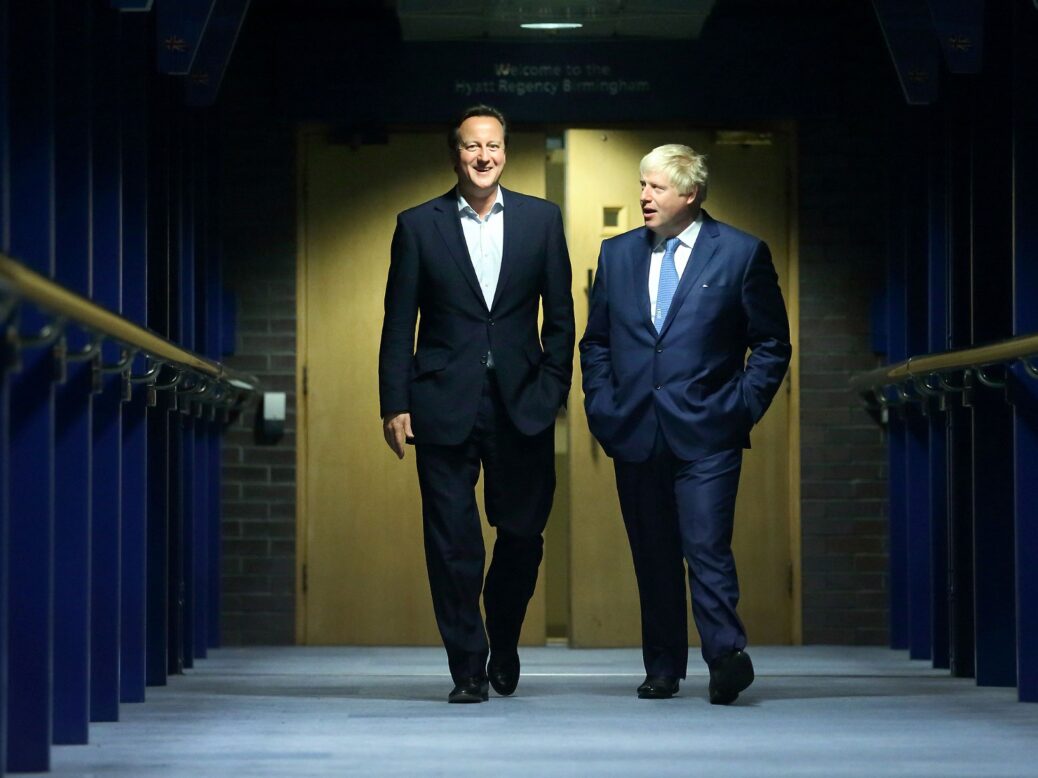
Boris Johnson has always managed to stand apart from his party.
When he was mayor of London and David Cameron was prime minister, Johnson always seemed to be making a nuisance of himself in the eyes of the Conservative Party.
Turning up at Tory conference each year, he would steal the spotlight and pack out the auditorium with adoring party members. He would periodically make irritating headlines with teasing answers to questions about his leadership ambitions (see: loose rugby balls, olive reincarnation and frisbee decapitation).
Under David Cameron, Conservative MPs didn’t tend to be particularly polite about Johnson, and he wasn’t seen as “one of them”. The party faithful appeared to find him at least more entertaining than the more po-faced ministers of the austerity era – delivering bad news and eschewing champagne.
Exclusive polling for the New Statesman by Redfield & Wilton Strategies, conducted across Britain on 19 May 2021, suggests this distinction endures, even now that Johnson is Prime Minister. Forty-four per cent think Boris Johnson’s Conservative Party has little in common with David Cameron’s Conservative Party, while just 28 per cent think it has a lot in common (27 per cent say they don’t know).
[See also: Exclusive: New polling suggests Boris Johnson neglects social care at his peril]
A plurality of those surveyed also believe that the 11 years since 2010 during which the Tories have been in power should not be considered as one long stint of government: 38 per cent believe the current 11-year tenure of the Conservative Party should be considered as “comprising distinct, different reigns”, while 32 per cent believe the 11 years should be considered as “comprising one, continuous reign” (30 per cent say they don’t know).
Arguably, Johnson’s greatest success as a campaigner and Prime Minister has been to separate his premiership from the Tory regimes that preceded it – thereby shedding any associations with the austerity agenda that has seen so many public services cut back.
This impression is one of the reasons a party that has been responsible for stripping back local hospital services and reducing police officer numbers can win in a constituency like Hartlepool – where health provision and crime are both priority issues.
Messaging about the damaging impact of cuts may not chime with the public as much as opposition parties would assume, according to the polling. Respondents are divided on whether they generally feel better or worse off than in 2010, with 29 per cent saying they feel worse off, 27 per cent better off, 35 per cent neither better nor worse, and 9 per cent saying they don’t know.
[See also: The new royal yacht is the embodiment of Boris Johnson’s hollow patriotism]
When asked specifically about their financial situation, 31 per cent think they are better off financially now than in 2010, 28 per cent say worse off, 31 per cent think they are neither better nor worse off, and 10 per cent don’t know.
The public also expresses aspiration and hope more than a feeling of being hard-done-by. Of participants who do not currently own their own home, for example, a plurality intend to own their own home one day (48 per cent), while 34 per cent do not and 18 per cent don’t know.
Of those who intend to own their own home one day, most (32 per cent) expect it will be realistic for them to be able to own their own home within the next three to five years, 24 per cent think it will be realistic within the next five to ten years, and 14 per cent think it will be realistic within the next ten to 20 years. Fourteen per cent say it will be realistic within the next year, 13 per cent say it is already a realistic prospect, and 3 per cent think it will be more than 20 years from now.
Such polling results present a challenge for the Labour party. They suggest that even after a decade of public service cuts and public sector pay freezes, and a pandemic that halted many businesses, freelance work and staff jobs overnight, the jury is still out on how people feel about their lot.
On top of this, more voters than not tend to separate the current government from its Conservative predecessors, allowing Johnson to avoid the blame for the recent policies of his own party – dampening the feeling you may expect after 11 years that it’s “time for a change”.
Although this is “hugely unfair, it is a fact”, in the words of a Labour grandee reflecting on this dilemma recently. The opposition may have more success in an alternative message to the usual attack lines about under-funding and cuts. As one expert in left-wing campaigning put it to me recently: “We’re really good at talking about problems, and trying to convince people things are really bad. We’re not so good at thinking about vision.”
[See also: Boris Johnson is no “man of the people” but a self-serving con artist]






